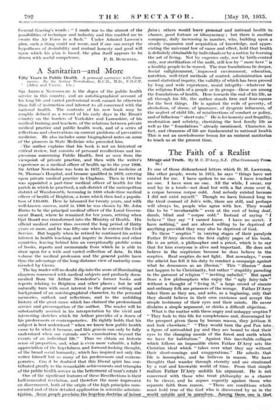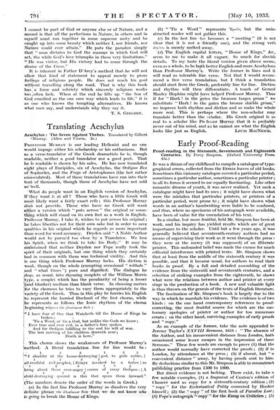. The Faith of a Realist
IN one of those disheartened letters which D. H. Lawrence, like other people, wrote in 1915, he says " things have not existed for me. I have spoken to no one. I have touched no one. I have seen no one. All the while, I swear, my soul lay in a tomb—not dead but with a flat stone over it, a corpse become corpse cold. And nobody existed because I did not exist myself." Though we have listened long to the tired counsel of Job's wife, there are still, and perhaps will always be, people who agree with her. They would like to be " invulnerable " even at the cost of being deaf, dumb, blind and "corpse cold." Instead of saying "I believe" they say "I cannot know. I have no secret. I have nothing," and are almost willing to be deprived of anything provided they may also be deprived of God.
To these " sceptics " in varying stages of their paralysis Father D'Arcy devotes the first eighty pages of his book. He is an artist, a philosopher and a priest, which is to say that for him everyone is alive and important. He does not believe in the scepticism because he does believe in the sceptics. Real sceptics do not fight. But nowadays, "even the atheist has felt it his duty to conduct a campaign against what he denounces as an illusion:" This " illusion " does not happen to be Christianity, but rather "stupidity parading in the garment of religion" "inviting unbelief." But apart from a few philosophers who enjoy the •" ugly fairy-tale" without a thought of "living it," a large crowd of sincere and ordinary folk are prisoners of the mirage. Father D'Arcy takes them as they are, and asks, as a beginning, only that they should believe in their own existence and accept the simple testimony of their eyes and their minds. He never disdains a simple argument, or shirks a difficult objection.
What is the matter with these angry and unhappy sceptics? "They look to this life for completeness and, discouraged by the prospect given them by human reason, they jettison it and look elsewhere." "They would turn the god Pan into a figure of untroubled joy and they are bound to shut their " eyes to the changing- moods of the forest and earth which we have for habitation." Against this inevitable collapse which follows an impossible claim Father D'Arcy sets the Christian ideal which "takes over what they say without their short-comings and exaggerations." He admits that life is incomplete, and he believes in reason. We have thoughts that wander through eternity and are straitened by a real and knowable world of- time. From that simple realism Father D'Arey unfolds his argument. He is not concerned with those who treat philosophy as a chance to be clever, and he argues cogently against those who separate faith from reason. "There are conditions which must hold true of the God who is discovered by us in the world onteds.a_ndiair ApjomIteaLlatis
I cannot be part of God or anyone else or of Nature, and a second is that all the perfections in Nature, in others and in myself must run together in some supreme unity and be caught up into some beauty which neither I, nor friends, nor Natnre could ever attain." He puts the paradox simply that "man dictates to God the manner in which God will aet;the while God's love triumphs in these very limitations." "‘,He was victor, but His victory had to come through the shathe of the Cross."
It is inherent in Father D'Arey's method that he will not allcriv that kind of statement to appeal merely to pious feelings of religious people. He does not reach his goal witliout travelling along the road. That is why this book has a force and sobriety which sincerely religious works too ,often lack. When at the end he lifts up "the Son of GO crucified as the one sure way which leads to life," it is as one who knows the tempting alternatives. He knows what men say, and understands why they say it.
T. S. GREGORY.



































































 Previous page
Previous page